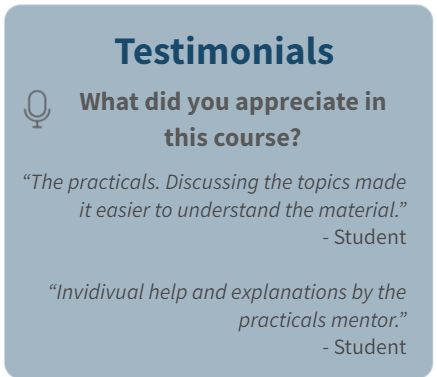Winner: Practical Introduction to Research Methods
Course Summary:
Practical Introduction to Research Methods, a course with 2-hour weekly practical sessions, has three main aims: developing research consumer skills, fostering effective research production abilities, and facilitating a successful transition to higher education. The course emphasizes the importance of relationships in teaching and focuses on meaningful connections between teachers and students, as well as between students and peers. Peer learning and collaborative activities are used to achieve these objectives.
Course Design:
The course was designed as part of an academic learning community comprising of 10-12 students who attend various academic skills courses together. The academic learning communities were led by peer mentors, usually second or third-year students, who offered support and guidance to first-year students during their transition to higher education.
The course utilized peer learning to foster trust, socio-emotional bonds, and observation and learning from one another. The mentors underwent extensive training, including topics like cognitive basis of learning, managing diversity, coaching, stimulating motivation, self-regulated learning, and managing learning communities. The course emphasizes collaborative learning activities wherein students work together to solve real-world problems, facilitated by the mentors. Lesson plans were tailored to students' stage of transition and were continually refined based on input from the mentors, reflecting a co-creation approach.
Feedback was considered crucial for student achievement, and high-quality feedback processes were prioritized in the course. Mentors provided in-lesson feedback, helping students answer three key questions: What are the learning outcomes? What progress was being made toward the learning outcomes? What activities were needed to improve progress? Additionally, peer-to-peer feedback dialogues were introduced to encourage students to become proactive in seeking, understanding, and using feedback on their performance.
The course aimed to create an environment promoting safety, trust, connection, and help-seeking, enabling effective collaborative learning among students. The combination of academic learning communities and guidance by mentors turned out to be an effective approach in supporting students' successful transition to higher education, fostering both academic and personal development. Currently, the course continually evolves and adapts itself based on feedback and the current literature, emphasizing student involvement in the feedback process, and nurturing a feedback culture that empowers students.
In the following video, you can watch designers of the course explain their motivations, processes and experiences of implementing the course.
Contact person:
Dr. Simon Dalley
